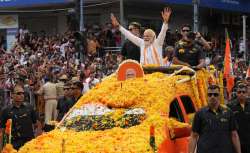Will Uniform Civil Code, as its key poll plank, help BJP win 2024 elections?
PM Modi's pitch for UCC was not just a statement for any state elections but for 2024 Lok Sabha elections. Abrogation of Article 370, Ram Temple at Ayodhya and implementation of UCC - these three promises have always been on the BJP's agenda.

'Two laws in a house is not acceptable,' roared Prime Minister Narendra Modi during a Bhopal event while making a strong pitch for the Uniform Civil Code (UCC), adding that the Constitution mentions having equal rights for all citizens. Hence, BJP has decided it would not adopt the path of appeasement and vote bank politics, and implement UCC, he clarified.
PM Modi's pitch for UCC was not just a statement for any state elections but for 2024 Lok Sabha elections. If poll pundits are to be believed, PM Modi has covered the last leg of the 2024 Lok Sabha elections by pitching for the UCC. Abrogation of Article 370, Ram Temple at Ayodhya and implementation of UCC - these three promises have always been on the BJP's agenda.
ALSO READ | Why are most Opposition parties against implementation of UCC? Explained in 5 points
The party, which received astounding support from people in 2014 and 2019 general elections, has already fulfilled the first two promises. And by pitching for the UCC, PM Modi has expressed confidence in the party's win in 2024 Lok Sabha elections - almost. PM Modi's special mention of UCC in his speech at Bhopal amply hinted that BJP's key poll plank is going to veer around UCC in the upcoming 2024 LS polls.
Abrogation of Article 370
One of the agendas of the BJP, since its inception, has been the abrogation of Jammu and Kashmir, which became a reality on August 5, 2019. On this day, Jammu and Kashmir was bifurcated into two Union territories of Jammu & Kashmir and Ladakh and ended its 'special status.'
In a gazette notification, the central government omitted the phrase “permanent resident of the state” from Section 17 of the Jammu and Kashmir Development Act which deals with disposal of the land in the union territory. The move allowed people to buy land or property in the Union Territory, or apply for government jobs - a long-withstanding demand. The BJP had called it one of its 'historic decision' after winning the 2019 polls.
The first agenda was accomplished.
Ram Temple in Ayodhya
One of the most important and also significant decisions of the BJP has been the construction of the Ram Temple in Ayodhya. Prime Minister Narendra Modi laid the foundation stone of Ram Mandir at Ayodhya in August 2020, thereby inaugurating the first phase of the temple construction. Union Home Minister Amit Shah's announcement that the temple is expected to open for people in 2024, ahead of the Lok Sabha elections, scheduled in the same year, further clarified that it would be a highly discussed issue during the mother of all the poll battles.
Uttar Pradesh Chief Minister Yogi Adityanath laid the foundation stone of the Ram temple's garbha griha (sanctum sanctorum) earlier in June 2022, marking the beginning of the next phase of construction of the main temple. If history serves right, BJP (then called Jan Sangh) had started a movement to realise the dream of the Ram Mandir. The dream became a reality when BJP made it one of its main agendas.
Second promise fulfilled.
Implementation of UCC
Implementation of the UCC has now become BJP's top priority - with eyes on 2024 polls. Going on the right track BJP-run states like Goa have already implemented it, while in Uttarakhand a promise was made in this regard ahead of its 2022 Assembly polls — it was also in his poll manifesto. The Pushkar Singh Dhami-led Uttarakhand government has formed a five-member committee headed by a retired Supreme Court judge to prepare a draft on UCC for the state.
For UCC, the Centre has been banking upon Supreme Court, which has time and again given a green signal in a few cases in order to provide equal justice to citizens. This was reflected when the SC made a decision on abolishing Tripple Talaq.
Why UCC
Uniform Civil Code has become the need of the hour as it aims at replacing personal laws based on religions, customs, and traditions with one common law for everyone irrespective of religion, caste, creed, sexual orientation, and gender. The UCC is mentioned in part 4th of the Constitution which says the state "shall endeavour to secure for the citizens.
According to Article 44, “the State shall endeavour to secure for the citizens a uniform civil code throughout the territory of India.”
The first time courts spoke of UCC
The first time that the courts spoke of a UCC was during the Shah Bano Case in the Supreme Court. During the Mohd Ahmed Khan v. Shah Bano Begum and Others (1985) case, the top court exhorted the central government to enact a “common civil code” in the interests of national integration. “Time has now come for the intervention of the legislature to provide for a uniform code of marriage and divorce as envisaged by Article 44,” court had observed.